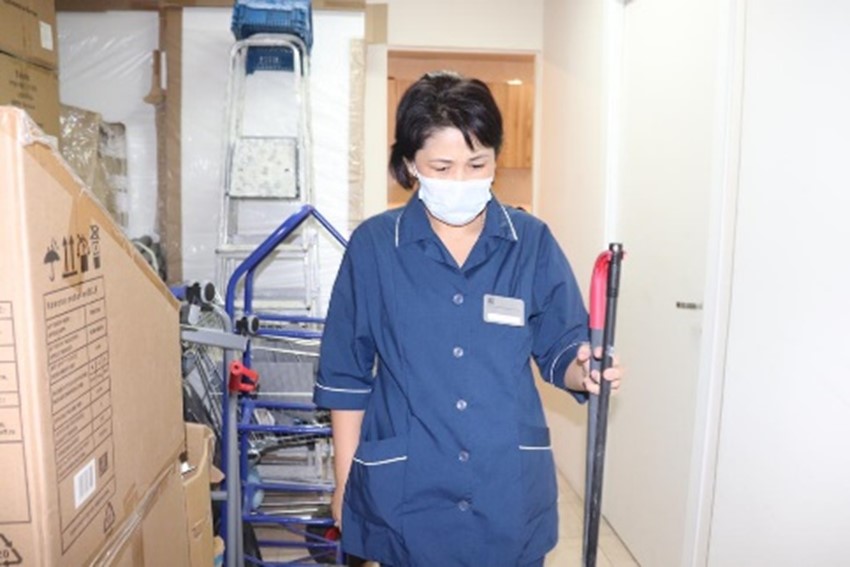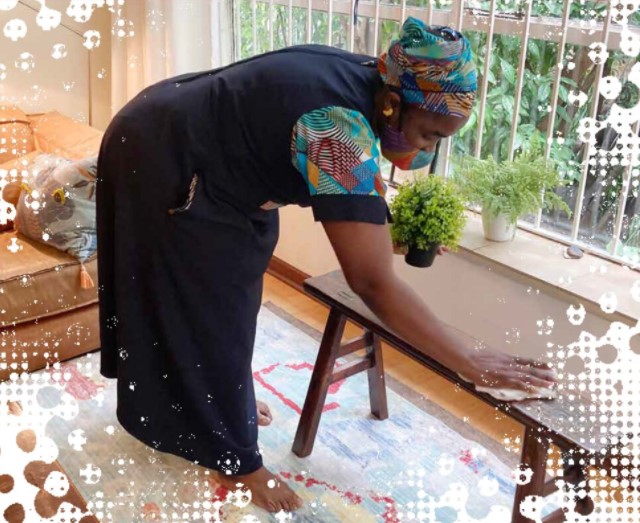
Mar 11, 2022
The Cotton Campaign—a global coalition of human rights, labor, responsible investor and business organizations—yesterday ended its call for a global boycott of Uzbek cotton at an event hosted by the country’s Ministry of Labor for media, activists and government officials in Tashkent, Uzbekistan. The announcement came as the Uzbek Forum for Human Rights released a report finding no central-government–imposed forced labor in the 2021 harvest, a success which the Campaign is proposing as a template for removing forced labor from the world’s supply chains. An estimated 2 million children have been removed from child labor and half a million adults from forced labor in Uzbekistan’s cotton sector since the multi-sectoral campaign formed.
“[We] have been looking forward to this day for over 14 years,” said Cotton Campaign co-founder and former U.S. Deputy Assistant Secretary of State for Democracy, Human Rights and Labor Bennett Freeman, who saluted the determination and courage of Uzbek-based activists and cotton-field monitors.
The historic achievement came after persistent engagement by Uzbek activists, who took on extraordinary personal risk to uncover and document forced labor, joined by multinational brands, international advocates and worker rights groups like the Solidarity Center, and a commitment by the government of Uzbekistan to end its use of forced labor. The boycott began in response to a 2009 petition by Uzbek civil-society activists that launched the Cotton Campaign’s Uzbek Cotton Pledge Against Forced Labor. Since then, 331 brands and retailers signed the pledge, including many of the world’s largest brands, among them C&A, Gap Inc. and Tesco.
“As a journalist and citizen of this country, I am proud to participate,” said Uzbek Forum for Human Rights cotton field monitor Muazzam Ibragimova, who added that her own children were likely headed to the cotton fields as recently as a decade ago.
Although Uzbek Forum’s report found that cotton was harvested without systematic state-imposed forced labor, monitors found cases of coercion and interference by local authorities, as well as individual cases of forced labor. Because independent groups that conduct field level monitoring and capacity building are unable to register and operate freely, progress is “at risk” says the Cotton Campaign in its press release. Given repressive policies that limit freedom of association in Uzbekistan and supply chain practices that have contributed to eroding labor standards in garment producing countries around the world, the Cotton Campaign is calling on the Uzbek government and brands to support worker rights as the industry is poised to grow, and for the government to open the country’s civil society to create the enabling environment necessary for responsible sourcing.
“We need a voice from the ground,” said the Solidarity Center Senior Program Officer for Europe and Central Asia Abby McGill, who added that workers must lead the charge if there is to be permanent success and continued progress in Uzbekistan’s fight against forced labor.
Cotton Campaign Steering Committee member, GLI-ILRF Forced Labor Program Director and human rights lawyer Allison Gill recognized the efforts and courage of Uzbek Forum monitors and pointed to the coalition’s success in Uzbekistan as a template for combating the use of forced labor in cotton sourced from other countries. More than one fifth of the world’s cotton is produced in China’s Xinjiang region where significant evidence of human rights abuses, including suspected forced labor, has been reported.
The Cotton Campaign, of which the Solidarity Center is a long-time member, is a global coalition of international human and labor rights NGOs, independent trade unions, brand and retail associations, responsible investor organizations, supply chain transparency groups, and academic partners. The campaign encourages responsible sourcing to ensure that reforms continue to benefit workers, farmers, and civil society.
GLJ–ILRF is a newly merged organization that brings strategic capacity to cross-sectoral work on global value chains and labor migration corridors.
Uzbek Forum for Human Rights is a Berlin-based NGO dedicated to protecting and promoting human rights and strengthening civil society in Uzbekistan.

Mar 2, 2022
In Nigeria—where 93 percent of working people toil in the informal economy for low wages, unprotected by labor law and without social services such as pensions and healthcare—app-based workers are fighting for their rights.
With Solidarity Center support, today the Federation of Informal Workers of Nigeria (FIWON), the National Union of Professional APP-Based Transport Workers (NUPA-BW) and the Professional E-Hailing Drivers and Private Owners of Nigeria (PEDPA) launched a joint campaign for formal recognition and adequate representation for all, regardless of classification.
“A worker is a worker,” says Solidarity Center Nigeria Country Program Director Sonny Ogbuehi. “And all working people have the right to join together to secure the decent jobs and fair wages they deserve.”
During the early part of the pandemic, employment in Nigeria plummeted. Although employment has since rebounded, most newly created jobs are precarious and the cost of living has skyrocketed. Many young people, including those who graduated university into the pandemic, are now employed in the gig economy or other informal-sector jobs because no formal-sector work is available.
Following a Supreme Court decision in the United Kingdom classifying Uber drivers as workers rather than independent contractors, NUPA-BW drivers in May last year announced a class action suit against two international app-based ridesharing companies for compensation of unpaid overtime and holiday pay, pensions, social security, as well as union recognition. A month prior, drivers in Lagos embarked on a strike for an immediate increase in fares to compensate for the cost of goods and services that, PEDPA said, had increased by more than 200 percent without a commensurate fare increase.
“We want [ride-share companies] to respect the Nigerian constitution and labor law,” says NUPA-BW President Ayoade Ibrahim.
The joint campaign’s demands include full worker and union rights; provision of social protection programs, including pensions, adequate and affordable healthcare, and disability care; provision by the employer of basic workplace infrastructure such as electricity, water and toilets; improved safety and security measures; and worker input into pricing.
The campaign will:
- Support a new NUPA-BW case at the national industrial court for classification of app-based drivers as workers
- Produce a weekly call-in radio program to educate the public about the challenges faced by workers employed by app-based companies and other informal-sector workers
- Facilitate platform workers efforts to organize and support their efforts to advocate for their rights with government and policy makers, employers and within the public domain.
Some 2 billion people work in the informal sector globally, as domestic workers, taxi drivers and street vendors, many of them women. This number has only increased during the COVID-19 pandemic. Informal-economy work now comprises most jobs in many countries and is increasing worldwide. Although informal-economy workers can create up to half of a country’s gross national product, most have no access to health care, sick leave or support when they lose their jobs, and they have little power to advocate for living wages and safe and secure work. The Solidarity Center is part of a broad-based movement in dozens of countries to help workers in the informal economy come together to assert their rights and raise living standards.

Feb 24, 2022
A study conducted by Insan-Leilek, a Kyrgyz migrant worker foundation, and the Trade Union of Migrants of the Kyrgyz Republic documents abuses suffered by many who migrate to Russia to earn their livelihoods as nannies, adult caregivers, cooks, cleaners and live-in domestic workers. An estimated 750,000 Kyrgyz people have migrated to Russia for work; official Kyrgyz government data estimates that half that number are women.
“We are invisible people,” says 34-year-old survey respondent and domestic worker Almagul. (Her last name is withheld to protect her livelihood and personal safety.)
“The Problems of Informal Domestic Workers,” reflects the experiences of 300 Kyrgyz migrant domestic workers, from whom 24 were selected for in-depth interviews by two migrant worker experts. Respondents’ jobs were in the Russian cities of Kazan, Moscow, Novosibirsk, Samara and Yekaterinburg.
The study reveals a wide range of employment abuses among the mostly female domestic workers who were surveyed, including sexual harassment and violence, other forms of physical and emotional abuse, unpaid hours, excessive workloads, denial of time off and wage theft.
More than 80 percent of the female survey participants who provided in-depth interviews reported sexual harassment at the hands of their employers. Of this group, almost 4 percent had experienced severe sexual violence, including rape, while 25 percent were subjected to indecent touching that included unwanted touching of intimate body parts. More than 30 percent of those reporting sexual harassment and violence said they could not ask anyone for help or support and, of this number, 7 percent attempted suicide. More than 70 percent of those providing in-depth interviews said they were often beaten, allegedly for laziness, and that they can rarely go out.
Two survey participants reported having become surrogate mothers for their employers without a written agreement or fair compensation.
Almost 90 percent of the larger group surveyed (300 respondents) were working without a formal contract because they had secured their jobs through personal connections. Such workers are vulnerable to unregulated work in which hours, pay, duties and conditions are determined at the whim of the employer, some of whom are unscrupulous and exploitive.
“I worked 24 hours a day, and I looked after the children, cooked, did the laundry. Weekends were out of the question,” reports Miraida about a job she held in Russia when she was 18.
Kyrgyz domestic workers in Russia provide an average of 10 hours of work per day, a survey of the larger group of 300 found. Of these, those who live in an employers’ home are working an average of more than 12 hours per day. More than 40 percent said they perform additional services that were not agreed with the employer at the time of hiring, without adjusted compensation.
Respondents were recruited for the survey through Trade Union of Migrants of the Kyrgyz Republic WhatsApp groups and Insan-Leilek diaspora organizations and migrant communities. In-depth interviews were conducted online and over the phone.
Russia is the main destination for approximately 750,000 of Kyrgyzstan’s labor migrants. Official data on the percentage of migrant women employed in domestic work in Russia does not exist.
Insan-Leilek foundation and the Trade Union of Migrants of the Kyrgyz Republic are actively engaged in anti-trafficking programs in Kyrgyzstan, with Solidarity Center support, including last year’s “100 Days Against Trafficking in Persons” youth campaign.

Feb 3, 2022
“The dignity of people’s very being is at stake,” said IZWI Domestic Worker Alliance’s founder and lead researcher Amy Tekie in opening remarks at a recent webinar focused on a new qualitative survey of human rights violations against live-in domestic workers in South Africa.

“Really awful things are happening behind closed doors,” said IZWI’s Amy Tekie.
“The Persistence of Private Power: Sacrificing Rights for Wages“—co-published by Johannesburg-based IZWI Domestic Workers Alliance and the Solidarity Center—surveys the constitutional and human rights of live-in domestic workers in South Africa. It describes how domestic workers’ rights to privacy, freedom of movement and children’s right to parental care are frequently sacrificed for wages in a sector underpinned by racism, sexism and classism. Resulting exploitation—largely invisible because of the private spaces in which it occurs—continues regardless of constitutional protections and industry-specific labor regulations.

We are expected to be indoors even when it is our off day,” said the survey’s lead field researcher Theresa Nyoni. Credit: IZWI
“We are not allowed to be seen around,” said the survey’s lead field interviewer, Theresa Nyoni, of a sectional title housing complex in which she was formerly employed as a domestic worker.
Nyoni described almost universally denied opportunities for live-in domestic workers in sectional title housing to enjoy open spaces on, or near, the employers’ property and lack of freedom to move around or receive visitors in their own quarters—even during off hours. And, for most live-in domestic workers, she noted invasive employer surveillance and almost total lack of privacy.
“We are sleeping with kids and not allowed to lock the door; parents barge into the room and even the bathroom,” she said.
Employers isolate domestic workers by routinely denying them visits from friends, spouses and children, and some domestic workers say they are not allowed to leave their employer’s home for any reason. Nyoni described her former employer’s refusal to allow her to leave the work premises, on her own time, to purchase and arrange for transportation of bulk food items to her own children during the pandemic.
“When I held a plate of food to eat, I was thinking: Did my children get food today?”
Survey interviewees outlined living conditions that Tekie described as “almost kidnapping [in its] constant and complete employer surveillance and control.” Besides being isolated from loved ones, many live-in domestic workers said they were denied employer permission to keep their infants with them, receive packages or use their employer’s kitchen to preserve and prepare their own food, and those employed in sectional title housing complexes reported repeated employer and security guard searches. Some live-in domestic workers said they have chosen abortions for fear of losing their jobs.
IZWI interviewed 115 mostly migrant live-in domestic workers for the survey, most of whom were working in or near Johannesburg—where working conditions are anecdotally better than those than in rural areas, said Tekie. Approximately half of South Africa’s more than 800,00 domestic workers live in by IZWI’s estimate, although definitive data does not yet exist, she said.

The survey affirms that state silence perpetuates the status quo, said McGill University Faculty of Law Professor Adelle Blackett.
McGill University Faculty of Law Professor of Transnational Labor and Development Adelle Blackett underscored the significance of the report being centered on the lived experience of domestic workers and the persistence of private power in their lives, even post-Apartheid.
Describing the report as “chilling,” Blackett defined the status quo for South Africa’s domestic workers as, “historicized, racialized, intersectionalized enslavement to domestic servitude.”

“[This report] is only the tip of the iceberg,” said former South African Labor Court judge Urmilla Bhoola.
The survey illustrates that translating South Africa’s laudable rights into reality for domestic workers is a tremendous challenge, said former South African Labor Court judge and former United Nations Special Rapporteur on Contemporary Forms of Slavery and panelist Urmilla Bhoola.
“When domestic workers live in, they forfeit their rights,” she said. And so, civil society legal activism is essential, including that spearheaded by trade unions, she added.
Report recommendations include extension to domestic workers of many of the rights contained in South Africa’s farmworker Extension of Tenure Security Act (ESTA) but absent from Sectoral Determination 7 governing domestic work. ESTA guarantees to farmworkers residing on employers’ land “the right to human dignity”—including privacy, having family life, the freedoms of association, movement and religion, and to have visitors and receive postal communication.” Alternatively, concludes the report, legislation specific to the domestic work sector should be created that includes:
- Minimum housing standards for all live-in domestic workers, not only those paying rent
- Basic regulations on rights to family life and visitors, including the right for family to cohabit with a worker, within residential density laws, and the right for workers to have visitors in their homes
- Regulations to protect privacy, explicitly preventing employers from searching rooms, phones or property without permission
- Clear protection of a worker’s right to move freely during off hours
- Guidelines on bullying, harassment and assault, as those provided in the labor law do not address the specifics of the domestic sector
- Guidelines for provision of food.

Nov 12, 2021
Победа в борьбе за гендерное равенство и равенство в оплате труда в бывшей советской республике Казахстан: в прошлом месяце эта страна отменила список рабочих мест, юридически недоступных для женщин с 1932 года. Такие дискриминационные списки, которые вынуждают женщин отказываться от более высокооплачиваемой работы в традиционно мужских секторах в пользу низкооплачиваемых профессий, в которых доминируют женщины, – типичны для данного региона, а также для Беларуси, Кыргызстана, России и Узбекистана.
Отмена данного списка в Казахстане стала возможной в результате многолетних усилий адвокации партнера Центра Солидарности – Казахстанского Международного Бюро по правам человека (КМБПЧ) на встречах, конференциях и других форумах с политиками и представителями правительства, включая Министерство труда и социальной защиты Республики Казахстан и Комиссию по правам человека при Президенте Республики Казахстан.
“В современном мире не должно быть дискриминационных ограничений на доступ к работе, и все люди сами имеют право выбирать, где и как работать”, – сказал заместитель директора КМБПЧ Денис Дживага.
Работа, в которой ранее женщинам было отказано, включала относительно хорошо оплачиваемые рабочие места в строительстве, металлообработке, горнодобывающей промышленности и нефтедобыче, в том числе: работы, выполняемые на высоте или под землей; квалифицированные строительные, дорожные и металлообрабатывающие работы, включая кладку, работу на землеройной технике, плавку руды, установку труб и сварку; а также специализированные работы в разведке и геодезии, такие как бурение скважин, установка вышек и прессование труб.
Международная организация труда (МОТ) уже давно призывает государства отменить списки профессий, запрещенных для женщин, учитывая их дискриминационное воздействие. Женщины в Казахстане, например, зарабатывают в среднем на 32 процента меньше, чем мужчины.
Список Казахстана, который ограничивал доступ женщин к более чем 200 профессиям на том основании, что работа была слишком тяжелой или опасной с физической точки зрения, был отменен после того, как правительство Казахстана признало в Комитете ООН по ликвидации дискриминации в отношении женщин (КЛДЖ), что запреты на работу способствовали неравенству в оплате труда мужчин и женщин. Комитет ООН по экономическим, социальным и культурным правам (CESR) рекомендовал Казахстану рассмотреть другие формы правовой защиты женщин, чтобы обеспечить их безопасность на работе, а не осуществлять полный запрет на доступ к определенным профессиям.
“Гендерное равенство и равенство в оплате труда требуют, чтобы мужчины и женщины имели равный доступ ко всем видам работы и чтобы все рабочие места были безопасными для всех работников”, – подчеркнул директор региональной программы Центра солидарности в Европе и Центральной Азии Руди Портер.









